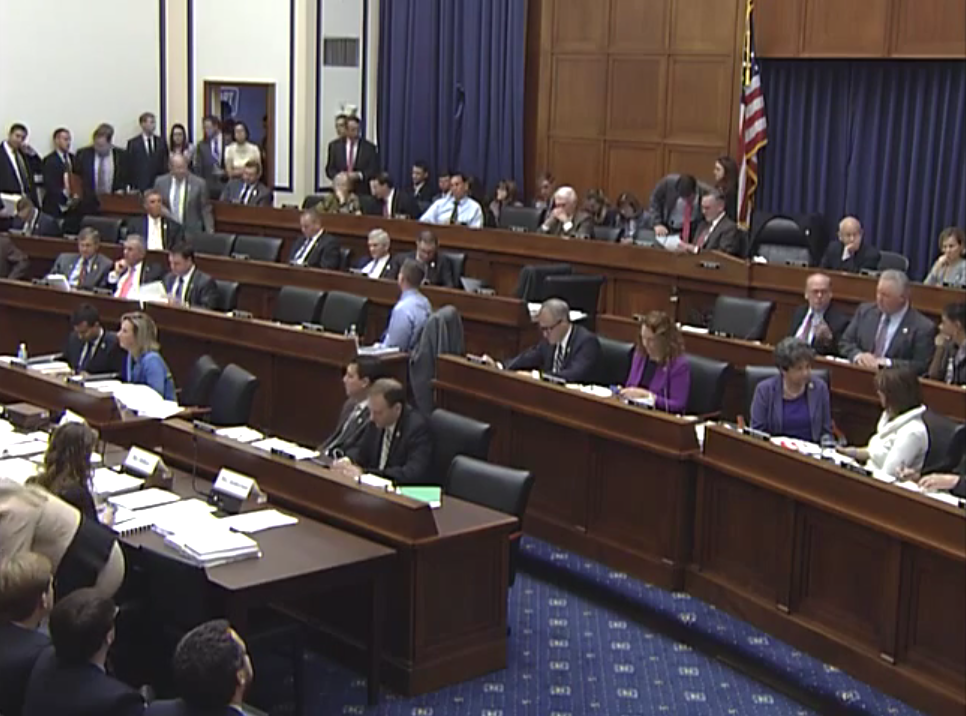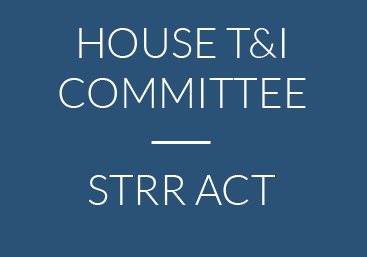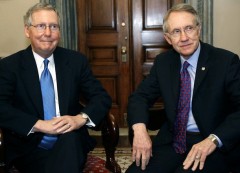The INVEST Act, which hits all three of Transportation for America’s three principles, is being considered this week on the House floor ahead of a final vote. There are a few key amendments being offered that could jeopardize these improvements, or further improve the already strong bill in support of our principles.
UPDATE (6/31): The INVEST Act was approved by House of Representatives! Read our full statement here. The amendments we were tracking have also all been voted upon. Jump straight to the tracker.
We heartily support the INVEST Act and encourage all representatives to vote for its passage, but well over 250 amendments were submitted to the INVEST Act to be considered before that final vote. We will be tracking the most notable amendments in a table below, but we want to draw your attention specifically to the seven amendments we will be paying careful attention to.
Transportation for America strongly supports five amendments to be included in the final bill:
- Amendment #15 (Moulton): this amendment increases the PRIME passenger rail program funding by $5 billion total, to modernize and develop passenger rail service (especially critical and affordable interstate travel options) while also expanding existing rail corridors throughout the country.
- Amendment #86 (Garcia (IL)): This amendment ensures that the street design manual used by all traffic engineers (the MUTCD) equitably accounts for all transportation users, especially cyclists and pedestrians. It furthermore directs the Secretary to update guidance on updating the MUTCD, targeting a four-year update cycle to ensure it stays current with evolving transportation needs.
The three following amendments from Rep. Hank Johnson would make changes to new and existing programs in the INVEST Act to help transit agencies run more buses and trains to serve more people. Rep. Johnson was proposing an amendment that would have created an entirely new program to fund transit operations, but it became clear that leadership is not allowing amendments to create entirely new programs at this point for the INVEST Act.
- Amendment #133 (Johnson (GA)): This amendment increases the eligible funding for transit operating expenses from the Carbon Pollution Reduction Program up to 20 percent, allowing states to use these funds to make transit service more frequent and reliable—which has a notable impact on carbon reduction.
- Amendment #139 (Johnson (GA)): This amendment prioritizes transit operations expenses in the Reducing Transit Deserts grant program by removing construction of maintenance facilities as an eligible expense. Maintenance facilities projects could swamp this small program and are eligible for funding elsewhere, while transit operations are harder to fund.
- Amendment #148 (Johnson (GA)): This amendment makes expanding transit service hours and/or days an eligible expense for the Reducing Transit Deserts grant program. The underlying program only focuses on improving frequencies, but extending service hours is just as important for reaching more riders who need transit the most.
Transportation for America also strongly opposes two amendments and urges all reps to vote against these short-sighted proposals:
- Amendment #144 (Perry (PA)): This amendment prohibits the use of funds to expand the Amtrak passenger rail network. At a time when communities across the country are clamoring for more connections and more options of all kinds—especially in places not well connected to airports or other interstates—this amendment is especially out of touch with the needs of Americans, both urban and rural alike.
- Amendment #247 (Gibbs (OH)): This amendment allows state DOTs—such as the Ohio DOT in Rep. Gibbs’ home state, which spends next to nothing on transit service statewide—to seize transit funding and spend that money on highways, overriding local control and eliminating funds from documented local multimodal needs. It also prohibits using transit funds for art, non-functional landscaping, and sculptures—or for paying the cost of including an artist on the design team. This might seem pennywise but it’s incredibly pound foolish. Allowing a small amount of transit funding to support artists’ involvement leads to projects that are more responsive to their surrounding communities’ needs, better incorporate the desires of riders, and avoid a one-size-fits-all approach. Additionally, these funds support local artists’ small businesses, further benefiting the communities adjacent to transit projects.
Full table of amendments
| Amendment Number | Sponsor(s) | Description | Theme | Our Position | Vote Format | Outcome |
|---|---|---|---|---|---|---|
| 1 | Langevin (RI), Titus (NV) | Requires the Department of Justice, in addition to the Secretary, to adopt the U.S. Access Board's Public Right-of-Way Accessibility Guidelines as enforceable standards. This will strongly influence the built environment to be designed and built to be more accessible and inclusive for persons with disabilities. | Equity / Accessibility | Support | En Bloc 1 | PASSED |
| 3 | Espaillat (NY), Nadler (NY), DeSaulnier (CA) | Allows local transportation agencies, in addition to MPOs, to be direct aid recipients of Metropolitan Performance Program funding. This allows direct, local and regional deployment of federal funds towards transportation needs. | Local Control | Support | En Bloc 4 | PASSED |
| 10 | Norcross (NJ) | Requires all Electric Vehicle Supply Equipment (EVSE) projects funded directly through the Federal Government to be performed by qualified electricians with Electric Vehicle Infrastructure Training Program certification. | Electric Vehicles | Support | En Bloc 1 | PASSED |
| 15 | Moulton (MA), Ocasio-Cortez (NY), Costa (CA), DelBene (WA), Strickland (WA), Espaillat (NY), Morelle (NY), Blumenauer (OR), Maloney, Carolyn (NY), Cleaver (MO), Titus (NV) | Increases the Passenger Rail Improvement, Modernization, and Enhancement (PRIME) program funding by $5 billion over the life of the bill, helping to modernize and develop passenger rail service (especially critical and affordable interstate travel options) while also expanding existing rail corridors. | Passenger Rail | Support | En Bloc 4 | PASSED |
| 18 | Velázquez (NY) | Revises the Climate Resilient Transportation Infrastructure Study to guarantee that residents of public housing and of other HUD-designated affordable housing programs are considered and benefit from resilient infrastructure investments. Further revises the study to consider the needs of and create opportunities for individuals registered with a one-stop career center in the climate resilient workforce. | Equity / Resiliency | Support | En Bloc 1 | PASSED |
| 28 | Ocasio-Cortez (NY) | Revises SEC. 1309(g) of the Active Connected Transportation grant program to direct the Secretary of Transportation to consider the extent to which a project would serve low income residents of economically disadvantaged communities when making grants. | Equity / Active Transportation | Support | En Bloc 1 | PASSED |
| 30 | Nehls (TX) | Strikes Division D of the bill (rail title). This would in essense, defund all rail infrastructure investment. | Passenger Rail | Oppose | Standalone | Not offered |
| 33 | Auchincloss (MA), Huffman (CA), Moulton (MA) | Provides municipalities with the ability to create and expand new mobility options, including on-demand public transportation projects. | Local Control | Support | En Bloc 1 | PASSED |
| 46 | Perry (PA) | Strikes section 1303, which establishes a clean corridors program to provide formula funding for EV charging and hydrogen fueling infrastructure. This would in essence, would keep us running a status quo on transportation energy sources that focuses exclusively on fossil fuels. | Electric Vehicles | Oppose | En Bloc 3 | Failed |
| 55 | Titus (NV), Moulton (MA) | Amends the Railroad Rehabilitation and Improvement Financing program to add rail carriers engaged in high-speed rail activities under the eligible entities for credit risk premium subsidy payments. Much like buying a home with little money down, there is a mortgage insurance premium paid; this amendment helps to provide financing to offset that insurance cost to finance passenger rail infrastructure projects. | Passenger Rail | Support | En Bloc 1 | PASSED |
| 84 | Levin, Andy (MI), Ocasio-Cortez (NY) | Amends eligible project considerations under Sec. 1303 Clean Corridors Program to include considerations for promoting efficient dwell times and amends Sec. 1303 Clean Corridors Program to include requirements for the provision of information on charging station placement through mapping applications. In essence, this amendment looks to ensure that charger turnover needs are considered in the design and placement, while also publicizing location information through consumer mapping tools. | Electric Vehicles | Support | En Bloc 1 | PASSED |
| 86 | Garcia, Jesús (IL) | This amendment ensures that the street design manual used by all traffic engineers (the MUTCD) equitably accounts for all transportation users, especially cyclists and pedestrians. It furthermore directs the Secretary to update guidance on updating the MUTCD, targeting a four-year update cycle to ensure it stays current with evolving transportation needs. | Safety / Equity / Standards | Support | En Bloc 4 | PASSED |
| 87 | Castor (FL) | Expands the Congestion Mitigation and Air Quality Improvement (CMAQ) program to allow funding to be used to offset the incremental cost of zero-emission medium- and heavy-duty vehicles, related zero-emission operations equipment, battery electric charging or fuel cell electric refueling infrastructure, and related infrastructure investments. | Electric Vehicles | Support | En Bloc 4 | PASSED |
| 103 | Torres, Norma (CA) | Raises authorization level of the Transportation Equity Research Program to $8,000,000 and gives DOT flexibility to conduct research. This will fund needed research to better understand and develop best practices on incorporating equity and inclusion into the transportation program. | Equity | Support | En Bloc 1 | PASSED |
| 113 | Torres, Ritchie (NY), Williams (GA), Omar (MN), Escobar (TX), Peters (CA) | Clarifies that projects to deck over a limited-access highway are eligible for funding under the Reconnecting Neighborhoods Program, a program focused on remediating economically-disadvantaged and historically excluded communities and emphasizes projects that provide for inclusive economic development. | Equity / Connectivity | Support | En Bloc 1 | PASSED |
| 118 | Crow (CO), Torres, Ritchie (NY), Moore (WI) | Ensures historically excluded communities are considered in the expansion of electric vehicle charging infrastructure deployment. | Equity / Electric Vehicles | Support | En Bloc 4 | PASSED |
| 133 | Johnson, Hank (GA) | This amendment increases the eligible funding for transit operating expenses from the Carbon Pollution Reduction Program up to 20 percent, allowing states to use these funds to make transit service more frequent and reliable—which has a notable impact on carbon reduction. | Public Transit | Support | En Bloc 4 | PASSED |
| 139 | Johnson, Hank (GA) | This amendment prioritizes transit operations expenses in the Reducing Transit Deserts grant program by removing construction of maintenance facilities as an eligible expense. Maintenance facilities projects could swamp this small program and are eligible for funding elsewhere, while transit operations are harder to fund. | Public Transit | Support | En Bloc 4 | PASSED |
| 144 | Perry (PA) | This amendment prohibits the use of funds to expand the Amtrak passenger rail network. At a time when communities across the country are clamoring for more connections and more options of all kinds—especially in places not well connected to airports or other interstates—this amendment is especially out of touch with the needs of Americans, both urban and rural alike. | Passenger Rail | Oppose | En Bloc 3 | Failed |
| 148 | Johnson, Hank (GA) | This amendment makes expanding transit service hours and/or days an eligible expense for the Reducing Transit Deserts grant program. The underlying program only focuses on improving frequencies, but extending service hours is just as important for reaching more riders who need transit the most. | Public Transit | Support | En Bloc 4 | PASSED |
| 151 | Perry (PA) | This amendment would strike the FTA Capital Investment Grant Program, which is used to provide funding for fixed guideway investments such as new and expanded rapid rail, commuter rail, light rail, streetcars, bus rapid transit, and ferries, as well as corridor-based bus rapid transit investments that emulate the features of rail. This would starve public transit system of much needed capital funding to replace their assets and expand their transit network. | Passenger Rail | Oppose | En Bloc 3 | Failed |
| 157 | Moore (WI) | Increases the percent set-aside for Low and Moderate Community Grant program within the Zero Emission Bus Grant Program from 10 percent to 15 percent. This will help communities tight on resources to be able to afford to purchase zero emission buses and charging infrastructure with additional federal support. | Equity / Electric Vehicles | Support | En Bloc 1 | PASSED |
| 166 | Rush (IL), Dingell (MI), Clarke, Yvette (NY), Tonko (NY), Adams (NC) | Promotes the domestic manufacture and use of advanced, fuel-efficient vehicles and zero-emission vehicles, and encourages electrification of the transportation sector. This will help promote electric vehicle technology as an augmentation of the existing vehicle experience (and getting people to touch, feel, and experience electric vehicles), while bolstering a growing domestic manufacturing industry. | Electric Vehicles | Support | En Bloc 4 | PASSED |
| 226 | Crawford (AR), Cheney (WY), Graves, Garret (LA), Rouzer (NC) | Strikes Section 1201's requirements that states prioritize state of good repair needs over constructing new highway capacity. Outright bad policy to keep on building new roads while the existing roads continue to fall apart. Talk about a huge safety risk and a hit on our wallet with congestion and accelerated vehicle damage. A new road in a sea of crumbling infrastructure, it won't get you far. | Maintenance | Oppose | En Bloc 3 | Failed |
| 237 | Jackson Lee (TX), Espaillat (NY) | Provides local governments more control over where the funds for the new "Safe Streets" program are spent, by requiring state Departments of Transportation to consult with the local governments before carrying out these complete streets’ projects. The “Safe Streets” program uses sets aside safety funds to reduce fatalities and serious injuries on public roads, with a focus on vulnerable road users such as pedestrians, bicyclists, scooters users, and motorcyclist. Very often, funding is steered by State DOTs without recognizing or consulting the on-the-ground local experience. This amendment looks to get local governments at the table as to where this funding is spent towards complete streets. | Local Control / Safety | Support | En Bloc 4 | PASSED |
| 247 | Gibbs (OH) | This amendment allows state DOTs—such as the Ohio DOT in Rep. Gibbs’ home state, which spends next to nothing on transit service statewide—to seize transit funding and spend that money on highways, overriding local control and eliminating funds from documented local multimodal needs. It also prohibits using transit funds for art, non-functional landscaping, and sculptures—or for paying the cost of including an artist on the design team. This might seem pennywise but it’s incredibly pound foolish. Allowing a small amount of transit funding to support artists' involvement leads to projects that are more responsive to their surrounding communities' needs, better incorporate the desires of riders, and avoid a one-size-fits-all approach. Additionally, these funds support local artists' small businesses, further benefiting the communities adjacent to transit projects. | Placemaking / Local Control | Oppose | En Bloc 3 | Failed |
| 251 | Brady (TX) | Revises the Railroad Rehabilitation and Improvement Financing program to add new conditions of assistance for loans and loan guarantees issued through the program. This only will add burdensome hurdles and complicate a critical program aimed to help finance rail infrastructure. | Passenger Rail | Oppose | En Bloc 3 | Failed |
| 261 | Tiffany, Thomas (WI) | Stipulates that no funds made available from the Highway Trust Fund may be expended for any purpose other than road and bridge construction. This short-sighted amendment would starve off funding from a significant portion of our transportation system, including our rail network, public transportation, active transportation infrastructure. Additionally, this amendment would starve off funding from critical research and education programs that advance transportation efficiency and safety. | Maintenance / Public Transit / Equity | Oppose | En Bloc 3 | Failed |






 Just one day after a procedural vote failed, the Senate late last Wednesday
Just one day after a procedural vote failed, the Senate late last Wednesday